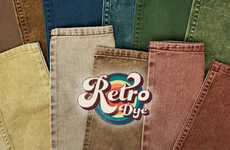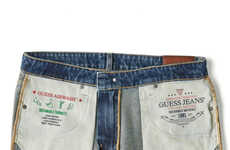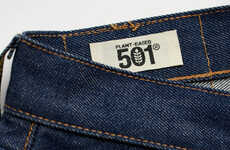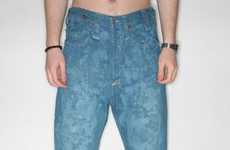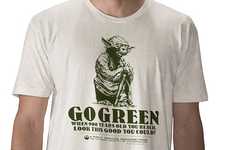
The Nudie Post Recycle Dry Jeans are Made Out of Old Nudie Products
Meghan Young — January 20, 2012 — Eco
As much as eco-friendly products might be the norm nowadays, items like the Nudie Post Recycle Dry Jeans can still raise some eyebrows. Sustainable hemp clothing is available -- there has even been artistic clothing creations made out of paper and plastic bags, but commercially sold recycled denim has to be a first.
The Nudie Post Recycle Dry Jeans are made out of old and worn Nudie Jean denim. Working in collaboration with ISKO, an international leader in denim manufacture, the company developed a new process in which old denim is cut, milled down to a pulp and then blended with virgin organic cotton to create a new fabric that has a soft, distinctive look.
The Nudie Post Recycle Dry Jeans also have a dark wash and straight fit with tonal stitching throughout.
The Nudie Post Recycle Dry Jeans are made out of old and worn Nudie Jean denim. Working in collaboration with ISKO, an international leader in denim manufacture, the company developed a new process in which old denim is cut, milled down to a pulp and then blended with virgin organic cotton to create a new fabric that has a soft, distinctive look.
The Nudie Post Recycle Dry Jeans also have a dark wash and straight fit with tonal stitching throughout.
Trend Themes
1. Recycled Denim - The trend of using old denim to create new, eco-friendly clothing presents an opportunity for disruptive innovation in the fashion industry.
2. Sustainable Fashion - The growing demand for sustainable clothing options opens up possibilities for disruptive innovation in the fashion industry, particularly in the use of organic materials and recycling techniques.
3. Circular Economy - The circular economy trend, as exemplified by the Nudie Post Recycle Dry Jeans, highlights the potential for disruptive innovation in repurposing and upcycling discarded materials in various industries.
Industry Implications
1. Fashion - Innovation opportunities in sustainable fashion include the development of new fabric recycling techniques and the use of alternative materials like hemp.
2. Textiles - The textile industry can explore disruptive innovation by incorporating recycled materials into their production processes, reducing waste and environmental impact.
3. Manufacturing - Disruptive innovation opportunities in manufacturing include creating new technologies and processes for repurposing and upcycling materials, contributing to a circular economy.
3.1
Score
Popularity
Activity
Freshness



